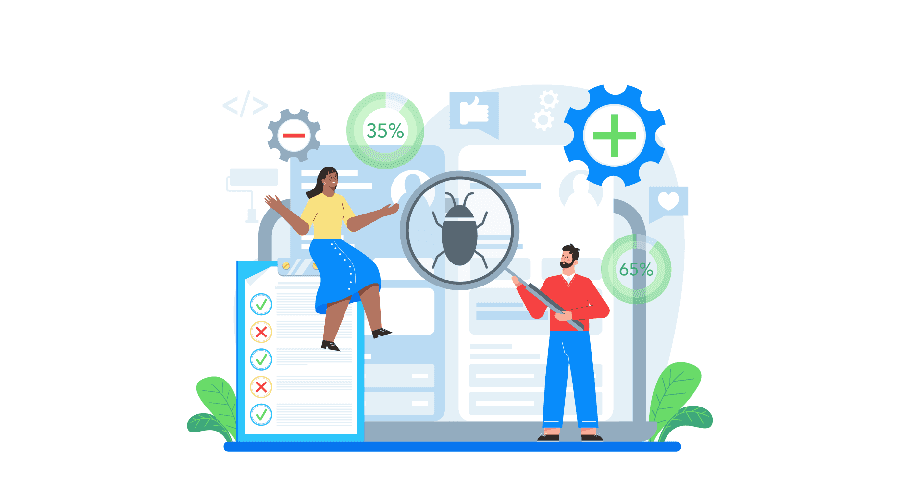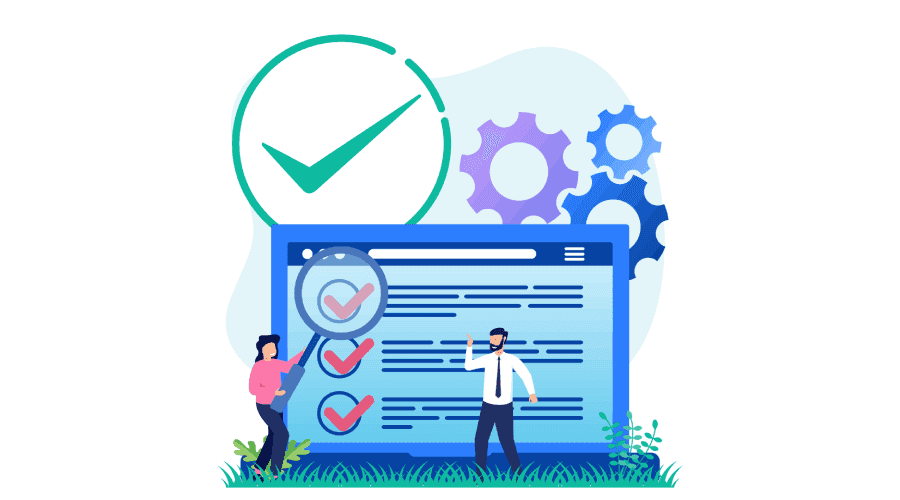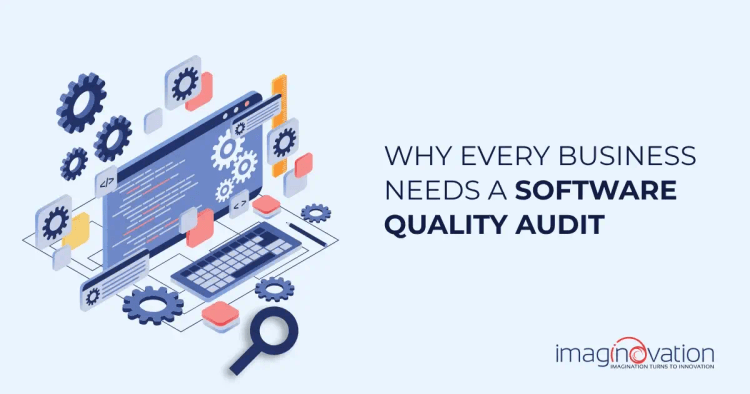To estimate the cost of building a website or an app, use our app cost calculator tool.
The software development market is incredibly competitive; hence, quality is key. Clients have low tolerance for poor performance, security breaches, and bugs, opting for the next-best software development vendor.
That’s why software quality audit is integral to software testing and development. It’s an inspection of each facet of an application to identify issues that could compromise its integrity.
Beyond uncovering the software’s vulnerabilities, software audits evaluate the development methodologies and processes to identify areas of improvement.
The process is so critical that companies that overlook software audits rack up technical debt. So why else does a business need software audit, and how do you do it? Read on to find out:
What is a Software Quality Audit?
A software audit is an impartial examination of software to check its quality and adherence to industry standards and regulations.
It’s a systematic evaluation of the software development practices to check its overall performance before it’s launched.
Internal or external auditors perform the audits. Internal audits are necessary during the testing phase to ensure the tools and methods used in the testing phase adhere to the expectations.
External auditors, on the other hand, check the software development practices and testing procedures to ensure compliance with industry standards. Software quality audit objectives can be summarized as follows:
- Verify licensing compliance
- Monitor quality assurance
- Track and report software use
- Ensure compliance with legal requirements
- To ensure compliance with industry standards
Note that software quality audit is different from software testing as it focuses on the quality of the software development process.
Quality assurance professionals strive to implement procedures that reduce defects and enhance the quality of the software.
Conversely, software testing aims at verifying that the application meets users’ requirements. As such, experts perform tests that can detect bugs to ensure the software works as expected.
Benefits of Conducting Software Quality Audits
Software quality audits have a great impact on software development standards of an organization. They also have the following benefits:
Optimize Processes
Software audits involve evaluating the development process and identifying areas of improvement.
Examining workflows helps identify areas of inefficiency and bottlenecks and implement procedures to eliminate them.
Well-optimized processes improve resource allocation, minimize development time, and create a culture of continuous improvement.
Overall, the audit helps improve software development standards, creating a path subsequent projects can follow.
Identify and Eliminate Software Problems
During software audit, experts identify issues that could compromise the software development process.
It could be inconsistent coding, ineffective quality control or testing procedures. Identifying such problems early in the development lifecycle helps a company take corrective actions.
Mitigate Risks
During software audits, experts discover various problems with the software or processes, allowing developers to correct them early.
It could be data privacy or security concerns. The developers can establish measures to mitigate such risks in future software development projects.
Ensure Compliance with Industry Standards
Software audits ensure companies comply with industry standards and practices. Experts assess whether the development process has been established within the defined frameworks and guidelines.
Compliance with industry standards guarantees that the software developed can deliver the desired outcomes.
Also, concerned stakeholders become confident in your work and are motivated to invest, use, or sell the software.
Components of a Software Quality Audit

The components of a software quality audit vary depending on the developer’s objectives but the most common are:
Planning: Here the auditor defines the objectives, project scope, and approach for the quality audit. The timelines are also defined and the resource allocated for each activity
Documentation review: The auditor must also review all the software-related documentation to understand the requirements, identify inconsistencies, and collaborate with the concerned stakeholders to resolve them
Test planning: The expert will also need to define the objectives of testing the software and develop strategies to do it. It’s during this stage that they use test cases and define the test plan and test resources required
Reviewing the code: At this point the auditor want to identify the coding standards developers use when developing the software. They’ll also find out security problems, potential bugs, and maintainability issues
Test evaluation: The auditor tests the software for defects or irregularities based on the test plan and document the results
Process review: The auditor also want to understand the software development process followed hence reviews them. They will assess their effectiveness in developing good software and if the client has adhered to them
Security assessment: The expert goes on to evaluate the measures put in place to ensure the software doesn’t cause breaches. They may use methods such as penetrating testing and vulnerability scanning
Compliance assessment: Here the auditor verifies the developer’s compliance with industry standards, legal regulations, and organizational practices
Performance evaluation: The expert must also analyze the software’s ability to perform as expected. They may use metrics such as resource utilization, response times, and scalability to evaluate performance
These components ensure high-quality software products are developed and adhere to industry standards and the best software development best practices.
Common Use Cases for Software Quality Audits
Here are a few use cases for which you will need the software quality audit.:
Case 1: Testing New Lab Software
A company that develops laboratory software for fast tissue analysis of targeted cancer treatment. The company needed a quality auditor to test its new software and develop testing documentation to help operate the device.
The QA also needed to ensure that the materials were standardized based on the company’s rules to help other specialists operate it.
Plan of Action
The software quality audit team met the company’s development team to understand its function and interaction with the hardware.
The team then analyzed the product’s requirements for consistency and relevance, and developed testing documentation. Lastly, the team tested the software based on the documentation to determine if its functional and user-friendly.
Results
The client’s software development team received documentation to helps them continue developing the software.
The company also implemented the suggested improvements to help update the software’s user experience. It also used the report to fix bugs and enhance quality.
Case 2: Alignment of Business Objectives and The Software’s Deliverables
The client contacted a software quality audit expert to help them align their business objectives with product’s deliverables.
This was after the company’s management team discovered that the project was taking the wrong direction.
Plan of Action
After meeting the client the audit team performed a business analysis, and gathered critical information to help them develop the following strategies:
- Verify and validate the existing system
- Interview the project’s stakeholders
- Interview the development team
- Perform a satisfaction survey
- Review the software development process
Perform a user experience audit to streamline navigation workflows and develop customer-oriented experience for the end user.
Results
The audit team develop a report providing implementation plans, recommendations, and findings to improve the software.
The customers loved using the software after implementing the suggestions.
Best Practices for Effective Software Quality Audits
Software audits ensure that only high-quality software products are released in the market. Even so, they can mount a tremendous financial strain on a company if not well implemented.
That’s why companies must follow these best practices when conducting software quality audits:

Collaboration of Auditors and Experts
Software quality audit is only successful if performed by experienced auditors. They should have a vast knowledge in software development, the processes involved and quality standards to identify discrepancies.
They may also need to collaborate with software development experts who can provide valuable insights on ways to enhance the effectiveness of the audit.
Emphasis on Quality Throughout the Development Cycle
Inculcating this culture early ensures developers are continually improving the software at each stage of development
This approach goes a long way in fostering collaboration and a culture of quality reducing the task load for software quality auditors. Moreover, audits become more effective and enhance the organization’s development standards.
Use of Automation and Analysis Tools
Experts should leverage automation tools for testing and analysis to save time and enhance accuracy. The tools make it easy to perform tedious procedures like report generation, code analysis, and testing.
The tools also help cover large scopes of the project and identify potential problems early.
Differentiate between Management and Tech Audits
Management and tech audit have somewhat similar procedures and it’s easy to combine them. Quality auditors must be keen not to mix them by performing them simultaneously.
This way the team identifies the main cause of critical problems and defines a clear cause-and-effect relationship for each case.
Applying a Systematic Auditing Approach
Software quality audits must be systematic and structured to ensure consistency and effectiveness. Thus, an auditors must define the audit methods they intend to use as well as the activities and steps to follow.
Final Words
Software audits are certainly critical to achieving technical deliverables. They help identify hidden costs, potential roadblocks, satisfaction rates, and software’s potential improvement areas
They also help you optimize processes, increase efficiency, and mitigating risks that could be replicated in future software development projects.
We always encourage our clients to perform software audits before launching the software or scaling to avoid costly mistakes . You can trust us to follow the industry’s best practices using our systematic and structured audit methodologies.
If you’re looking for an audit team to review your software, contact us.
Let's Talk.











